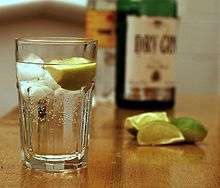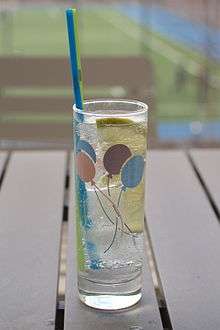Gin and tonic
 | |
| Gin and tonic with lime wedge | |
| Primary alcohol by volume | |
|---|---|
| Served | Poured over ice cubes (on the rocks) |
| Standard garnish |
A slice or wedge of lime |
| Standard drinkware | Highball glass or rocks glass |
| Commonly used ingredients |
Gin and tonic water, according to taste |
| Preparation | In a glass filled with ice cubes, add gin and tonic. |
A gin and tonic is a highball cocktail made with gin and tonic water poured over ice. It is usually garnished with a slice or wedge of lime. The amount of gin varies according to taste. Suggested ratios of gin to tonic are between 1:1 and 1:3.[1][2][3]
In some countries (e.g. UK), gin and tonic is also marketed pre-mixed in single-serving cans.[4] In the United States, most bars use "soda out of a gun that in no way, shape or form resembles quinine water", according to bartender Dale DeGroff.[1] To get a real gin and tonic, DeGroff recommends specifying bottled tonic.[1] Alternatively, one can add tonic syrup to soda water.[5]

The drink is a particular phenomenon as its taste is quite different from the taste of its constituent liquids which are rather bitter. The chemical structures of both ingredients are of a similar molecular shape and attract each other, shielding the bitter taste.[6]

It is commonly referred to as a "G and T" in the UK, US, Canada, Australia, New Zealand and Ireland.[7] In some parts of the world, it is called a "Gin Tonic" (e.g. Germany, the Netherlands, Japan ジン・トニック - phonetically "Gin Tonic"). Some brands will replace the word "gin" with their own brand or initial in recipes. For instance, "Sapphire and Tonic" for Bombay Sapphire,[8] "Hendrick's and Tonic" for Hendrick's Gin (garnished with cucumber to further distinguish it),[9] or "T&T" for Tanqueray.[10][11]
Garnish
Gin and tonic is traditionally garnished with a slice or wedge of lime, often slightly squeezed into the drink before being placed in the glass. In most parts of the world lime remains the only usual garnish; however, in the United Kingdom it has become common to use lemon as an alternative fruit; use of both fruit together is known as an "Evans".[12] Although the origins of the use of lemons are unknown, their use dates back at least as far as the late 1930s.[13] In addition lemons are often more readily available, and cheaper to purchase, than limes. The use of lemon or lime is a debated issue[14] and while leading brands, such as Gordon's,[15] Tanqueray[16] and Bombay Sapphire[17] recommend the use of lime, the founder of Fevertree Tonic Water prefers lemon. Some people garnish a Beefeater-based gin and tonic with a slice of orange, to complement the Seville oranges Beefeater uses in its botanicals. A gin and tonic served with Hendrick's Gin is typically garnished with a slice of cucumber.[14] However, garnishes of cucumber are very rare, and garnishes of orange are rarer still.
History
The cocktail was introduced by the army of the British East India Company in India. In India and other tropical regions, malaria was a persistent problem. In the 1700s it was discovered by Scottish doctor George Cleghorn that quinine could be used to prevent and treat the disease.[18] The quinine was drunk in tonic water, however the bitter taste was unpleasant.[18] British officers in India in the early 19th century took to adding a mixture of water, sugar, lime and gin to the quinine in order to make the drink more palatable, thus gin and tonic was born.[19] Soldiers in India were already given a gin ration, and the sweet concoction made sense.[20] Since it is no longer used as an antimalarial, tonic water today contains much less quinine, is usually sweetened, and is consequently much less bitter.[21]
Gin and tonic is a popular cocktail during the summer.[22] A 2004 study found that after 12 hours, "considerable quantities (500 to 1000ml) of tonic water may, for a short period of time, lead to quinine plasma levels at the lower limit of therapeutic efficacy and may, in fact, cause transitory suppression of parasites". This method of consumption of quinine was impractical for malaria prophylaxis, as the amount of drug needed "can not be maintained with even large amounts of tonic". The authors conclude that it is not an effective form of treatment for malaria.[23]
Spanish variations

In Spain, a variation on the drink called Gin-Tonic has become popular. This differs from a traditional gin and tonic as it is served in balloon glass [24] or coupe glass with plenty of ice and a garnish tailored to the flavours of the gin. The drink could be fruit-based but the use of herbs and vegetables, reflecting the gin's botanicals, is increasingly popular.[25] The balloon glass is used because the aromas of the drink can gather at its opening for the drinker to more easily appreciate.[26]
The popularity of this variation of the gin and tonic has led to the establishment of Gin-Tonic bars, in which customers can choose their preferred gin, tonic, and garnish from a menu.[27]
In popular culture
The transgalactic nature of the gin and tonic is imagined in Douglas Adams' novel The Restaurant at the End of the Universe, which describes how "85% of all known worlds in the Galaxy, be they primitive or highly advanced, have invented a drink called jynnan tonnyx, or gee-N'N-T'N-ix, or jinond-o-nicks, or any one of a thousand or more variations on the same phonetic theme. The drinks themselves are not the same, and vary between the Sivolvian 'chinanto/mnigs' which is ordinary water served at slightly above room temperature, and the Gagrakackan 'tzjin-anthony-ks' which kills cows at a hundred paces; and in fact the one common factor between all of them, beyond the fact that the names sound the same, is that they were all invented and named before the worlds concerned made contact with any other worlds."
James Bond specifies a recipe for a gin and tonic while in Kingston, Jamaica in the book Dr. No. Unusually it involves the juice of a whole lime.[28]
In the movie The Year of Living Dangerously, Colonel Henderson, when he first meets Guy Hamilton, complains when his gin and tonic is served with ice, explaining that only Americans drink it like that.
Ian Gillan mentions the cocktail in the song "Sleeping On The Job": "Ultrasonic, gin and tonic, sleeping on the job".
Billy Joel mentions the cocktail in the song "Piano Man": "Making love to his tonic and gin".
Senses Fail mentions the cocktail in the song "Can't Be Saved": "Go fill up a glass with tonic, rocks and gin and drink yourself to happiness".
Oasis also mention the cocktail in their song "Supersonic": "I'm feeling supersonic, give me gin and tonic".
Nik Kershaw begins his 1983 song "I Won't Let the Sun Go Down on Me" with the words: "Forty winks in the lobby, make mine a G&T".
On the popular sitcom How I Met Your Mother, character Barney Stinson played by Neil Patrick Harris is often heard ordering a gin and tonic. On one occasion where he serves as a bartender, the audience learns that he does not know what the drink consists of.
Gin and tonic is one of John Constantine's drinks of choice in the Hellblazer comics. Gin and Tonic is also the drink of choice for hero, Cat, in Jeaniene Frost's Night Huntress Series.
Founded in 2010, International Gin & Tonic Day is celebrated worldwide on the 19th October.[29]
See also
- Dubonnet, another drink invented to encourage European colonial soldiers in tropical climates to take quinine
- Lillet, an aperitif wine
- Pink Gin, Plymouth gin mixed with Angostura bitters
- Quinquina, a quinine-containing beverage sometimes used as a mixer with gin
- Tequila and tonic
References
- 1 2 3 Jon Bonné (2006-02-08). "Secrets to a perfect gin and tonic". MSNBC. Retrieved 2010-06-02.
- ↑ Herbst, Sharon; Ron Herbst (1998). The Ultimate A-to-Z Bar Guide. New York: Broadway Books. p. 175. ISBN 978-0-7679-0197-0.
- ↑ Regan, Gary (2003). The Joy of Mixology. New York: Clarkson Potter. p. 261. ISBN 978-0-609-60884-5.
- ↑ "Greenall's Gin & Tonic 250ml product information". Tesco.com. Retrieved 2010-06-02.
- ↑ Sintumuang, Kevin (2011-08-13). "Build a Better Gin and Tonic | Half Full - WSJ". online.wsj.com. Retrieved 2014-06-25.
- ↑ Rathi, Akshat. "Why does gin and tonic taste so good?". Retrieved 2016-07-18.
- ↑ "G and T". Oxford Dictionaries. April 2010. Oxford University Press. 6 December 2010.
- ↑ "Bombaysapphire.com". Bombaysapphire.com. Retrieved 2014-06-25.
- ↑ Hendrick's Curiositorium
- ↑ Archived 7 October 2010 at the Wayback Machine.
- ↑ Archived 19 June 2010 at the Wayback Machine.
- ↑ Knoll, A & Smith, D (2013). The Craft of Gin. Hayward: White Mule Press. p.69. ISBN 978-0-983-63896-4.
- ↑ "Gin and Tonic as served at the Shepheard's in Cairo" Gilbey's Gin advert from Punch Magazine, April 1938
- 1 2 https://www.nytimes.com/interactive/2013/05/22/dining/lemonlime.html?_r=0
- ↑ Recommendation from Gordon's (a market leading brand in the United Kingdom) may be found on their UK website.
- ↑ Use of lime is advice on the Tanqueray website, here.
- ↑ Recommendation from Bombay Sapphire (a popular UK brand) may be found on their UK website.
- 1 2 "From Charles Mackintosh's waterproof to Dolly the sheep: 43 innovations Scotland has given the world". The independent. 30 December 2016.
- ↑ Tonic water: sweet, bitter medicine. Retrieved 30 December 2009.
- ↑ Raustiala, Kal (2013-08-28). "Gin and tonic kept the British Empire healthy: The drink’s quinine powder was vital for stopping the spread of malaria". Slate.com. Retrieved 2014-06-25.
- ↑ Burkhart, Jeff (2010). "Do you know where your New Year's cocktail comes from?". National Geographic Assignment. Archived from the original on 24 April 2011. Retrieved 2010-12-01.
- ↑ "Gin and tonic syrups".
- ↑ C. G. Meyer; et al. (December 2004). "Editorial: Gin tonic revisited.". Trop Med Int Health. 9 (12). PMID 15598254. doi:10.1111/j.1365-3156.2004.01357.x.
- ↑ "Bombay Pushes Gin-trend with glassware". www.thedrinksbusiness.com. Retrieved 2012-01-09.
- ↑ "The 8 Great Gins of London Gin Club". Archived from the original on 21 September 2013. Retrieved 2012-08-15.
- ↑ "World Gin Day Gin Tonica Tasting". SummerFruitCup.com. Retrieved 2012-07-06.
- ↑ "Spain's Gin And Tonic Bars". foodrepublic.com. Retrieved 2012-07-06.
- ↑ "The James Bond Gin & Tonic". tjbd.co.uk. Retrieved 2012-08-11.
- ↑ "International Gin & Tonic Day - 10/19/2013". liquor.com. Archived from the original on 20 October 2013. Retrieved 2013-10-19.
External links
| Wikimedia Commons has media related to Gin and tonic. |


